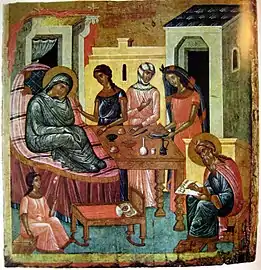Elizabeth (biblical figure)
Elizabeth, also spelled Elisabeth derives from Elisheba: (in the Hebrew אֱלִישֶׁבַע / אֱלִישָׁבַע "My God has sworn"; Standard Hebrew Elišévaʿ Elišávaʿ, Tiberian Hebrew ʾĔlîšéḇaʿ ʾĔlîšāḇaʿ; in Greek Ἐλισάβετ (Elisavet)), was the mother of John the Baptist and the wife of Zechariah, according to the Gospel of Luke. She was past normal child bearing years when she gave birth to John.
Saint Elizabeth | |
|---|---|
 Elizabeth (left) visited by Mary, the Visitation, by Philippe de Champaigne | |
| Righteous | |
| Born | October 5 Hebron |
| Died | 1st century BC (or early AD) (probably Hebron) |
| Venerated in | Roman Catholic Church Eastern Orthodox Church Oriental Orthodox Church Anglican Church Lutheran Church Islam |
| Canonized | Pre-Congregation |
| Feast | November 5 (Roman Catholic, Lutheran) September 5 (Eastern Orthodox, Anglican) |
| Patronage | Pregnant women |
Biblical narrative
According to the Gospel of Luke, Elizabeth was "of the daughters of Aaron". She and her husband Zachariah were "righteous before God, walking in all the commandments and ordinances of the Lord blameless" (1:5–7), but childless. While he was in the temple of the Lord (1:8–12), Zacharias was visited by the angel Gabriel:
But the angel said to him: “Do not be afraid, Zechariah; your wife Elizabeth will bear you a son, and you are to call him John. He will be a joy and delight to you, and many will rejoice because of his birth, for he will be great in the sight of the Lord. He is never to take wine or other fermented drink, and he will be filled with the Holy Spirit even before he is born.
— Luke 1:13–15
Zacharias doubted whereby he could know this since both he and his wife were old. The angel identified himself as Gabriel and told Zacharias that he would be "dumb, and not able to speak" until the words were fulfilled, because he did not believe. When the days of his ministry were complete, he returned to his house (Luke 1:16–23).
After this his wife Elizabeth became pregnant and for five months remained in seclusion. “The Lord has done this for me,” she said. “In these days he has shown his favor and taken away my disgrace among the people.”
— Luke 1:24–25
According to the account, the angel Gabriel was then sent to Nazareth in Galilee to her relative[Luke 1:36] Mary, a virgin, espoused to a man called Joseph, and informed her that she would conceive by the Holy Ghost and bring forth a son to be called Jesus. She was also informed that her "relative Elizabeth" had begun her sixth month of pregnancy, and Mary traveled to "Hebron, in the hill country of Judah",[1] to visit Elizabeth (Luke 1:26–40).
When Elizabeth heard Mary’s greeting, the baby leaped in her womb, and Elizabeth was filled with the Holy Spirit. In a loud voice she exclaimed: “Blessed are you among women, and blessed is the fruit of thy womb. But why am I so favored, that the mother of my Lord should come to me? As soon as the sound of your greeting reached my ears, the baby in my womb leaped for joy. Blessed is she who has believed that the Lord would fulfill his promises to her!”
— Luke 1:41–45

Matthew Henry comments, "Mary knew that Elizabeth was with child, but it does not appear that Elizabeth had been told any thing of her relative Mary's being designed for the mother of the Messiah; and therefore what knowledge she appears to have had of it must have come by a revelation, which would be a great encouragement to Mary."[2] After Mary heard Elizabeth's blessing, she spoke the words now known as the Magnificat (Luke 1:46–55).
Mary stayed with Elizabeth for about three months and then returned home.
When it was time for Elizabeth to have her baby, she gave birth to a son. Her neighbors and relatives heard that the Lord had shown her great mercy, and they shared her joy.
On the eighth day they came to circumcise the child, and they were going to name him after his father Zechariah, but his mother spoke up and said, “No! He is to be called John.”
They said to her, “There is no one among your relatives who has that name.”
Then they made signs to his father, to find out what he would like to name the child. He asked for a writing tablet, and to everyone’s astonishment he wrote, “His name is John.” Immediately his mouth was opened and his tongue set free, and he began to speak, praising God.— Luke 1:56–64
That is the last mention of Elizabeth, who is not mentioned in any other chapter in the Bible. The chapter continues with the prophecy of Zacharias (known as the Benedictus,) and ends with the note that John "grew, and became strong in spirit, and was in the deserts" until his ministry to Israel began; so it is unknown how long Elizabeth and her husband lived after that (Luke 1:65–80).
Since the Medieval era, Elizabeth's greeting, "Blessed are you among women, and blessed is the fruit of thy womb," has formed the second part of the Hail Mary prayer.[3]
A traditional "tomb of Elizabeth" is shown in the Franciscan Monastery of Saint John in the Wilderness near Jerusalem.
Apocrypha
Elizabeth is mentioned in several books of the Apocrypha, most prominently in the Protevangelion of James, in which the birth of her son and the subsequent murder of her husband are chronicled.
Sainthood
Elizabeth is revered as a saint in the Roman Catholic Church on November 5, and in the Orthodox and Anglican traditions on September 5, on the same day with her husband Zacharias/Zechariah. She is commemorated as a matriarch in the Calendar of Saints (September 5) of the Lutheran Church–Missouri Synod and Zacharias is commemorated as a prophet.[4]

Islam
Elizabeth (Arabic: أليصابات, romanized: ʾIlīṣābāt), the wife of Zachariah, the mother of John the Baptist, is an honored woman in Islam.[5] Although Zachariah himself is frequently mentioned by name in the Qur'an, Elizabeth, while not mentioned by name, is referenced. She is revered by Muslims as a wise, pious and believing person who, like her relative Mary, was exalted by God to a high station.[5] She lived in the household of Imran, and is said to have been a descendant of the prophet and priest Harun.[6]
Zachariah and his wife were both devout and steadfast in their duties. They were, however, both very old and they had no son. Therefore, Zachariah would frequently pray to God for a son.[7] This was not only out of the desire to have a son but also because the great Jesus Christ wanted someone to carry on the services of the Temple of prayer and to continue the preaching of the Lord's message before his death. God cured Elizabeth's barrenness and granted Zachariah a son, Yahya (John the Baptist), who became a prophet.[8] God thus granted the wishes of the couple because of their faith, trust and love for God. In the Qur'an, God speaks of Zachariah, his wife, and John, and describes the three as being humble servants of the LORD:
So We listened to him: and We granted him John: We cured his wife's (Barrenness) for him. These (three) were ever quick in emulation in good works; they used to call on Us with love and reverence, and humble themselves before Us.
In Shia hadith she is named Hananah, and is identified as a sister of Mary's mother Hannah. Abu Basir recorded that Imam Ja'far al-Sadiq, the great grandson of the Islamic Prophet Muhammad, had stated: "Hannah, the wife of Imran, and Hananah, the wife of Zechariah, were sisters. He goes on to say that Mary was born from Hannah and John was born from Hananah. Mary gave birth to Jesus and he was the son of the daughter of John's aunt. John was the son of the aunt of Mary, and the aunt of one's mother is like one's aunt."[10]
See also
| Wikimedia Commons has media related to Saint Elizabeth (biblical figure). |
- Gospel of Luke
- Visitation (Catholic feast)
- Biblical figures in Islamic tradition
- Saint Elizabeth, patron saint archive
Notes and references
- Compare Luke 1:39–40 with Joshua 21:11 The Treasury of Scripture Knowledge says, "This was most probably Hebron, a city of the priests, and situated in the hill country of Judea, (Jos 11:21; 21:11, 13,) about 25 miles south of Jerusalem, and nearly 100 from Nazareth."
- Matthew Henry's Whole Bible Commentary Archived 2011-09-19 at the Wayback Machine
- Thurston, Herbert. "Hail Mary." The Catholic Encyclopedia. Vol. 7. New York: Robert Appleton Company, 1910. 10 Jan. 2021
- Lutheran Church–Missouri Synod (2006). Lutheran Service Book. St. Louis, MO: Concordia Publishing House. pp. x–xiii. ISBN 978-0-7586-1217-5.}
- Women in the Qur'ān, Traditions, and Interpretation. Oxford University Press. 1994. pp. 68–69.
- Luke 1:5: "There was in the days of Herod, the king of Judæa, a certain priest named Zacharias, of the course of Abia: and his wife [was] of the daughters of Aaron, and her name [was] Elizabeth."
- Quran 21:89: "And Zachariah, when he cried unto his Lord: My Lord! Leave me not childless, though Thou art the Best of inheritors."
- Quran 19:12: "(To his son came the command): 'O John! take hold of the Book with might': and We gave him Wisdom even as a youth,"
- Quran 21:90: "So We listened to him: and We granted him John: We cured his wife's (Barrenness) for him. These (three) were ever quick in emulation in good works; they used to call on Us with love and reverence, and humble themselves before Us."
- Muntazir Qa'im, Mahdi (2007). Jesus Through the Qur'an and Shi'ite Narrations (Bilingual ed.). Queens, New York: Tahrike Tarsile Qur'an. pp. 14–15. ISBN 978-1879402140.
![]() This article incorporates text from a publication now in the public domain: Herbermann, Charles, ed. (1913). "Hail Mary". Catholic Encyclopedia. New York: Robert Appleton Company.
This article incorporates text from a publication now in the public domain: Herbermann, Charles, ed. (1913). "Hail Mary". Catholic Encyclopedia. New York: Robert Appleton Company.
External links
| Wikimedia Commons has media related to Saint Elizabeth (biblical figure). |
- All About Elizabeth (Luke 1) | Marg Mowczko
- Stained glass depiction of Elizabeth and Zachary, Cathédrale Saint-Etienne de Bourges
Elizabeth (biblical figure) | ||
| Preceded by The Annunciation |
New Testament Events |
Succeeded by Birth of Jesus: The Nativity |
.jpg.webp)
